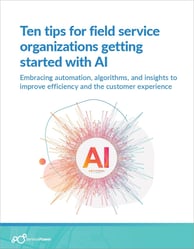AI Scheduling for Field Service: Benefits & Use Cases
What is AI Scheduling in the field service industry? AI scheduling is a key aspect of field service software that optimizes and automates technician...
3 min read
 ServicePower
:
February 12, 2024
ServicePower
:
February 12, 2024

Artificial intelligence (AI) is dominating technology trends. The excessive hype can be confusing, leaving organizations wondering if they are doing all they should or if they are at risk of falling behind the competition. For field service organizations (FSOs), AI’s transformative impact is still being defined, as organizations scramble to understand potential use cases and best practices. This blog provides some tips for launching your AI strategy.
The current state of AI adoption
According to Technavio, the field service software market is expected to grow by $1.46 billion by 2028. This massive increase is driven by the fact that many of the challenges the industry faces can be addressed by replacing on-site management with cloud-based software. This allows technicians to self-manage their jobs, improves workforce productivity, and guarantees efficient customer service.
AI is very much on the minds of technology leaders, including those in the field service industry. A 2023 survey found that 70% of organizational leaders believe the benefits of AI outweigh the risks – but only 15% of them feel prepared for the demands ahead. So if you have concerns, you’re not alone.
Companies that perform field service are especially vulnerable to today’s market pressures, giving them extra motivation to consider AI applications.
FSOs need to set realistic expectations. AI will not solve all business problems overnight. It is a process of adapting and learning. Practical applications, like schedule optimization, provide a smart place to start.
Ten tips for field service organizations getting started with AI:
The topic of AI is complex with many factors to consider. Plus, functionality and use cases continually evolve, with new applications rapidly emerging. To remain competitive, field service organizations must stay attuned to trends and best practices. ServicePower, with schedule optimization insights, can help you launch a practical AI strategy.

What is AI Scheduling in the field service industry? AI scheduling is a key aspect of field service software that optimizes and automates technician...

Understanding the value, risks, and necessary precautions of AI applications may seem overwhelming. For organizations with field service operations,...

Double-digit growth, 50% team expansion, and accelerated innovation define 2025 momentum.
